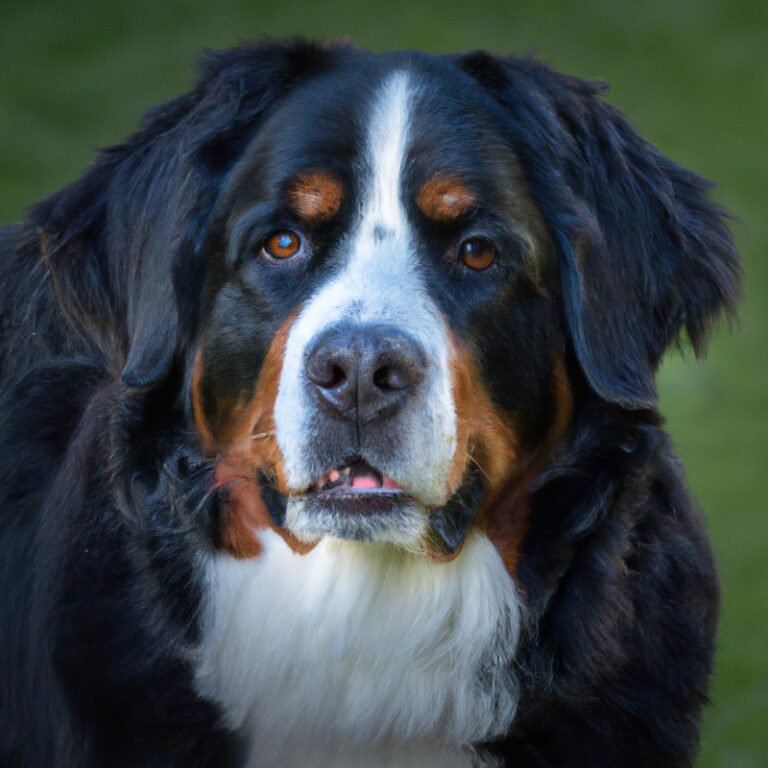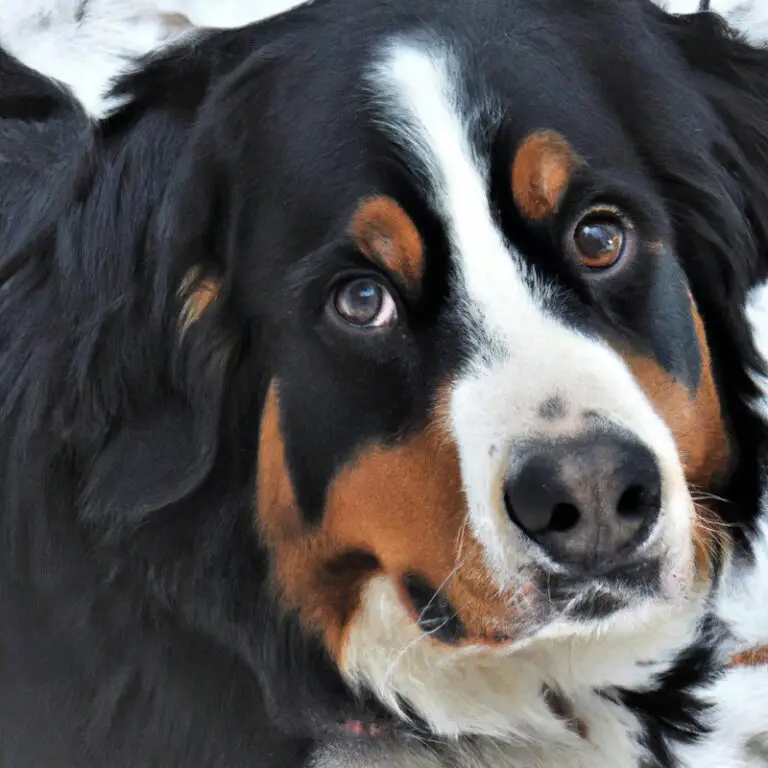Are Bernese Mountain Dogs Hypoallergenic?
Key Takeaways:
- Bernese Mountain Dogs are not considered to be hypoallergenic.
- They have a thick double coat that can trigger allergies in some individuals.
- Regular grooming and cleaning can help minimize allergic reactions.
- It’s important to consult with a healthcare professional before bringing a Bernese Mountain Dog into your home if you have allergies.
Are you a dog lover with allergies?
Have you been dreaming of adding a four-legged friend to your family, but worried about the sneezing and itching that usually comes with it?
Well, fear not, because today we’re diving into the topic of whether Bernese Mountain Dogs are hypoallergenic.
As a fellow dog lover and allergy sufferer, I understand the struggle of wanting a furry companion without the unpleasant symptoms.
In this article, we’ll explore the definition of hypoallergenic dogs, the characteristics of Bernese Mountain Dogs, and whether they could be a suitable choice for people with allergies.
So, let’s get started on this myth-busting adventure!
| Hypoallergenic Type | Bernese Mountain Dogs |
|---|---|
| Shedding Level | High |
| Dander Production | Low |
| Allergenic Proteins | Low |
| Common Allergens | Fur and dander |
| Common Allergic Reactions | Sneezing, itchy eyes, congestion |
| General Hypoallergenic Rating | Not hypoallergenic |
What is a hypoallergenic dog?
Definition of hypoallergenic dogs
Hypoallergenic dogs are breeds that are less likely to cause allergies in people. These dogs produce fewer allergens, such as dander, saliva, and urine.
While no dog is completely hypoallergenic, certain breeds have hair instead of fur, which reduces shedding and can minimize allergic reactions.
Examples of hypoallergenic breeds include Poodles, Bichon Frises, and Portuguese Water Dogs. It’s important to note that individual allergies can vary, so spending time with a specific hypoallergenic dog breed before bringing one home is recommended.
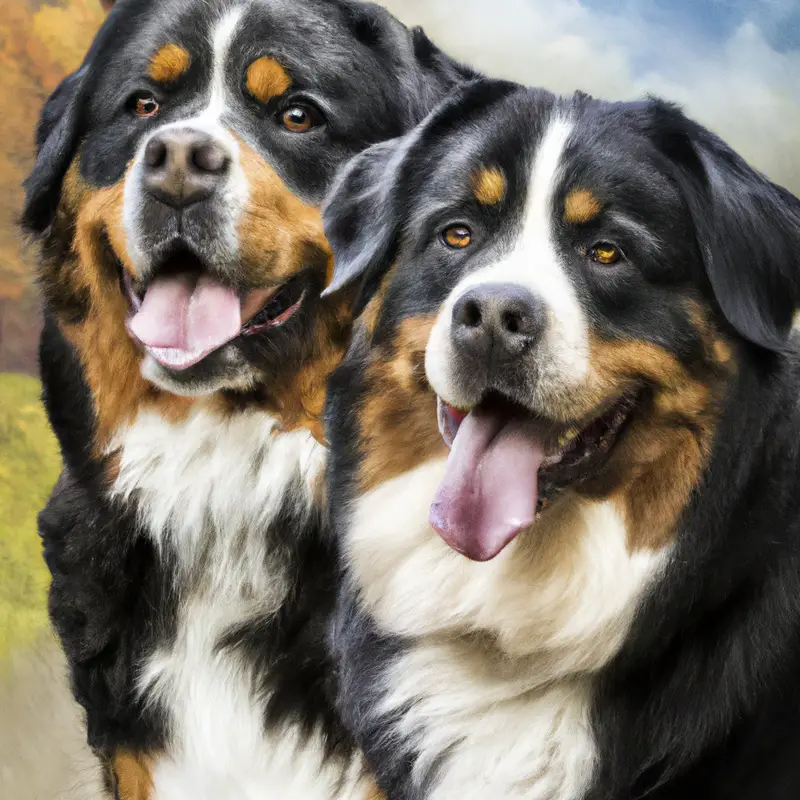
How hypoallergenic dogs are different from other breeds
Hypoallergenic dogs are different from other breeds in terms of their coat and dander production. Here are a few key ways they stand out:
- Hypoallergenic dogs have a reduced likelihood of triggering allergies in sensitive individuals due to their minimal shedding and low dander production.
- Some hypoallergenic breeds have hair instead of fur, which tends to trap allergens and dander, minimizing their release into the environment.
- These breeds often require regular grooming to prevent matting and keep their coat hypoallergenic-friendly.
- While no dog is completely hypoallergenic, these breeds are generally better tolerated by individuals with allergies compared to others.
Understanding allergies to dogs
Common dog allergies among humans
Common dog allergies among humans can include reactions to dog hair, dander, saliva, and urine.
Symptoms may vary, but can include sneezing, coughing, itchy skin, watery eyes, and even asthma attacks in severe cases.
In some individuals, certain breeds of dogs may trigger an allergic response more than others.
It’s important to consult with a healthcare professional for proper diagnosis and management of dog allergies.
Symptoms of dog allergies
Dog allergies can present a range of symptoms, including sneezing, coughing, and a runny or stuffy nose. You might also experience itchy, red, or watery eyes, as well as skin rashes or hives.
Some people may even have difficulty breathing or develop asthma-like symptoms.
These reactions occur when your immune system overreacts to proteins found in a dog’s dander, saliva, or urine. It’s important to be aware of these symptoms if you suspect you have a dog allergy.
Characteristics of Bernese Mountain Dogs
Overview of Bernese Mountain Dogs
Bernese Mountain Dogs are large, gentle, and affectionate dogs.
They are known for their striking black, white, and brown coat and their calm and friendly demeanor.
These dogs are incredibly loyal and make great family pets.
They thrive on human companionship and love being a part of the family.
However, it’s important to note that Bernese Mountain Dogs require regular exercise and grooming to keep them healthy and happy.
Overall, they are wonderful companions for those who enjoy an active lifestyle and have the time to dedicate to their care.
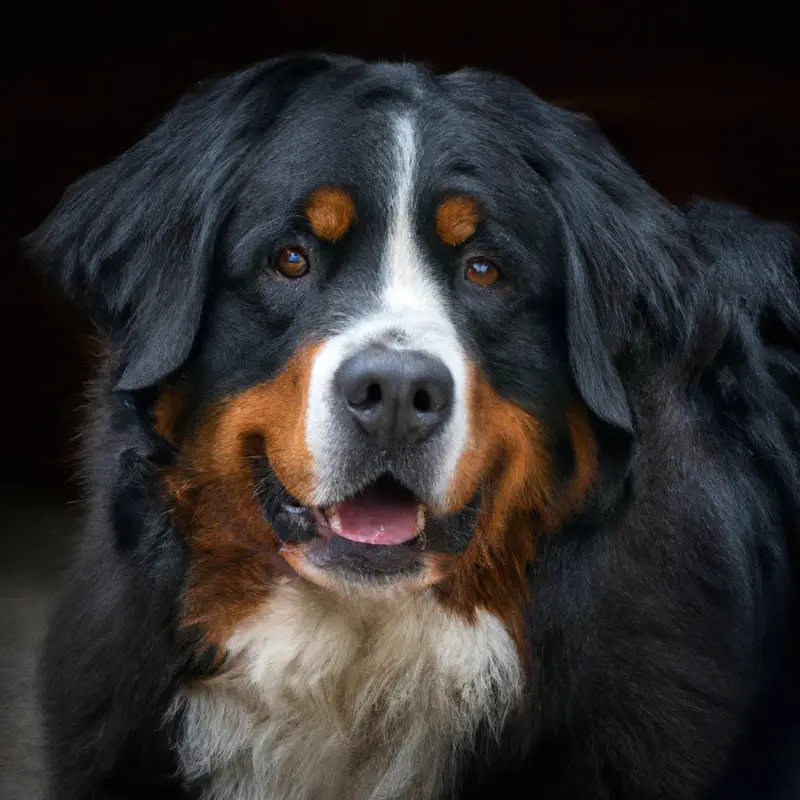
Shedding and dander production in Bernese Mountain Dogs
Bernese Mountain Dogs are known for their thick, double coats, which result in moderate shedding. They have a dense undercoat and a longer, wavy outer coat.
While they don’t shed excessively year-round, they do have two heavy shedding seasons in the spring and fall.
During these times, you can expect more shedding and the need for regular brushing to control the amount of loose hair. As for dander production, Bernese Mountain Dogs are not considered hypoallergenic.
Dander, which is made up of dead skin cells, can still cause allergies in sensitive individuals.
If you have allergies, be mindful of this before considering a Bernese Mountain Dog as a pet.
Are Bernese Mountain Dogs hypoallergenic?
Exploring the hypoallergenic nature of Bernese Mountain Dogs
Bernese Mountain Dogs are not considered hypoallergenic.
They have a thick double coat that sheds regularly, which can cause allergies for some individuals.
It’s important to note that while Bernese Mountain Dogs may not be hypoallergenic, allergies can vary from person to person.
Regular grooming and cleaning can help minimize allergens in the environment.
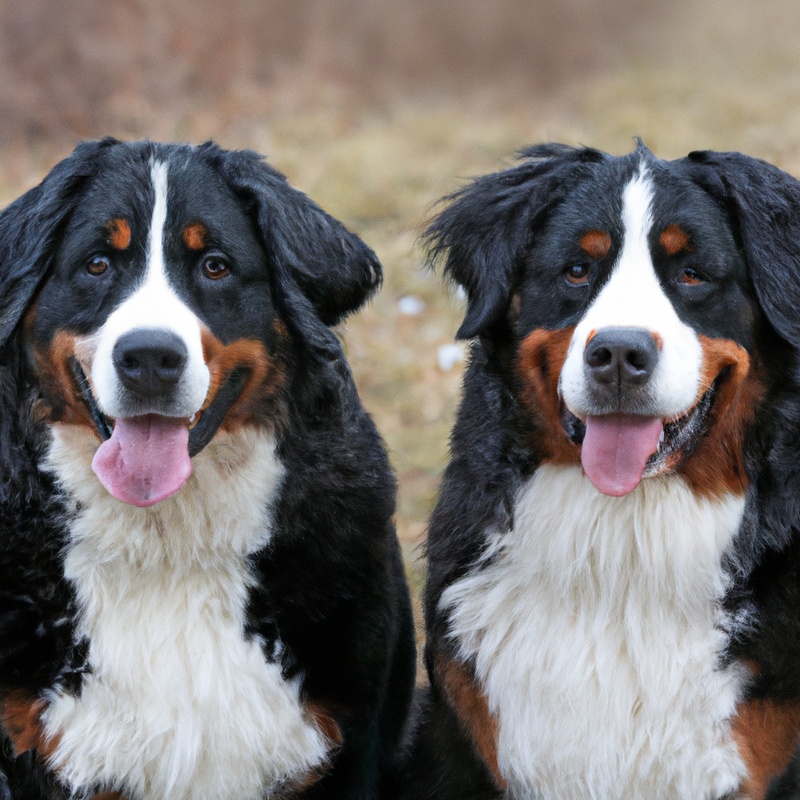
Factors to consider before getting a Bernese Mountain Dog
Before getting a Bernese Mountain Dog, there are a few factors you should consider. Firstly, be aware that they are a large breed and require ample space to roam and exercise.
Secondly, they have a thick double coat that sheds heavily, so if you have allergies, this may not be the best choice for you.
Thirdly, their life expectancy is around 6 to 8 years, so it’s important to be prepared for the potential health issues that may arise. Ultimately, make sure you have the time, space, and resources to provide for this beautiful and lovable breed.
Testimonials and experiences of people with allergies owning Bernese Mountain Dogs
I’ve heard from several people who have allergies and own Bernese Mountain Dogs, and their experiences have been positive. One person shared that they had mild allergies but didn’t experience any allergic reactions around their Bernese Mountain Dog.
Another mentioned that although they have allergies, they found that regular grooming and keeping their dog clean greatly reduced their symptoms.
It’s important to note that every person’s allergies are different, so it’s always best to spend some time with a Bernese Mountain Dog before bringing one home to see how you personally react.
Managing allergies for dog owners
Tips for reducing allergens in the home
Reducing allergens in your home can greatly help manage your allergies. A few simple tips include regularly vacuuming carpets and upholstery, using hypoallergenic bedding, and washing bedding in hot water weekly.
Additionally, keeping windows closed during high pollen seasons and using air purifiers can help filter out allergens.
Regularly dusting surfaces and minimizing clutter can also prevent dust mites from accumulating. Remember, maintaining a clean and allergen-free home can make a big difference in reducing your allergy symptoms.
Regular grooming and bathing for allergen control
Regular grooming and bathing are essential for controlling allergens if you have a dog with allergies. Brushing your dog’s coat on a regular basis helps to remove loose hair, dander, and allergens that can irritate allergies.
Bathing your dog with a hypoallergenic shampoo can also help to reduce allergens on their skin and coat.
Additionally, keeping your dog’s ears clean and regularly trimming their nails can further minimize allergen buildup. Remember to consult with your veterinarian for specific grooming recommendations for your dog’s breed and allergies.
Medical interventions and treatments for allergies
When it comes to managing allergies, medical interventions and treatments can be quite effective.
Here are a few options to consider:
- Antihistamines: These medications can help relieve itching, sneezing, and other allergy symptoms by blocking the release of histamine in the body.
- Allergy shots: Also known as immunotherapy, this treatment involves receiving regular injections of small amounts of the allergen to desensitize the immune system over time.
- Nasal sprays: Corticosteroid nasal sprays can help reduce inflammation in the nasal passages and alleviate symptoms of allergic rhinitis.
- Eye drops: Prescription eye drops can provide relief from itchy, watery eyes caused by allergies.
- Decongestants: Over-the-counter decongestant medications can help relieve nasal congestion and sinus pressure, but they should be used short-term due to potential side effects.
Remember, it’s crucial to consult with a healthcare professional to determine the best course of action for your specific allergies.
Frequently Asked Questions (FAQs)
Can hypoallergenic dogs still cause allergies in sensitive individuals?
Yes, hypoallergenic dogs can still cause allergies in sensitive individuals.
While hypoallergenic breeds may produce fewer allergens, no dog is completely allergen-free.
People with allergies can still react to the proteins found in a dog’s saliva, urine, or dander.
It’s crucial to spend time with the specific hypoallergenic dog you’re considering to see if you have any allergy symptoms.
Additionally, regular grooming, vacuuming, and keeping the dog out of bedrooms can help reduce allergen exposure.
Are there any dog breeds that are 100% hypoallergenic?
No, there are no dog breeds that are 100% hypoallergenic. While some breeds are considered hypoallergenic, meaning they produce fewer allergens, no breed is completely allergen-free.
Dog allergies can still be triggered by dander, saliva, and urine.
However, certain hypoallergenic breeds may cause fewer symptoms in individuals with allergies. It’s important to note that everyone’s allergies are unique, so it’s essential to spend time with a specific breed before making a decision.
Can allergy medications help in reducing reactions to dogs?
Allergy medications can help reduce reactions to dogs.
Antihistamines, such as cetirizine and loratadine, can help relieve symptoms like sneezing and itching.
Nasal sprays and eye drops can also alleviate congestion and redness.
However, it’s important to remember that medications only provide temporary relief and don’t address the underlying allergy.
Consult with a healthcare professional for personalized advice on managing your dog allergies.
Are there alternative breeds for people with allergies?
Yes, there are alternative breeds for people with allergies. Some hypoallergenic dog breeds include the Poodle, Bichon Frise, Maltese, and Portuguese Water Dog.
These breeds produce less dander, which is the primary allergen for most people.
Additionally, mixed breed dogs may also be a good option as they can inherit lower allergen levels from their hypoallergenic parent. It’s important to note that even hypoallergenic breeds may still cause allergies in some individuals, so it’s best to spend time with the specific dog before making a decision.
What steps can be taken to reduce allergens in households with non-hypoallergenic dogs?
To reduce allergens in households with non-hypoallergenic dogs, there are some steps you can take.
- Regular grooming: Regular brushing, bathing, and grooming can help remove loose fur and dander from your dog’s coat, reducing the amount of allergens in your home.
- Clean your home frequently: Vacuuming, dusting, and mopping can help remove allergens from surfaces and the air. Use a vacuum cleaner with a HEPA filter for maximum effectiveness.
- Create boundaries: Consider keeping your dog out of bedrooms and other areas where you spend a lot of time. This can help minimize exposure to allergens.
- Use allergen-proof bedding and covers: Encase your mattress, pillows, and cushions in allergen-proof covers to prevent allergens from accumulating in these areas.
- Wash fabrics regularly: Regularly wash your dog’s bedding, as well as other fabrics such as curtains and upholstery, to reduce allergen buildup.
Remember, while these steps can help reduce allergens, they may not completely eliminate them.
If you have severe allergies, it’s always a good idea to consult with a healthcare professional for personalized advice.
Final Verdict
Bernese Mountain Dogs are not hypoallergenic.
These beautiful and loyal dogs have a thick double coat that sheds heavily, producing dander which can trigger allergies.
However, individual reactions may vary, and some people with allergies have reported successfully living with Bernese Mountain Dogs by taking proper measures.
It is important to consider personal tolerance, grooming habits, and hygiene routines when deciding if a Bernese Mountain Dog is suitable for you or your family.
While they may not be hypoallergenic, their loving nature and companionship can make them a worthwhile addition to the right household.




